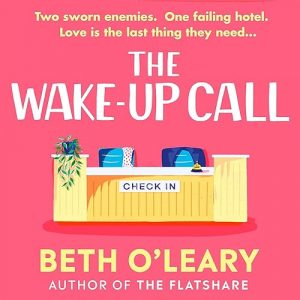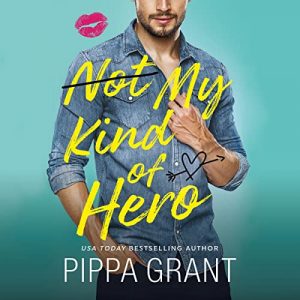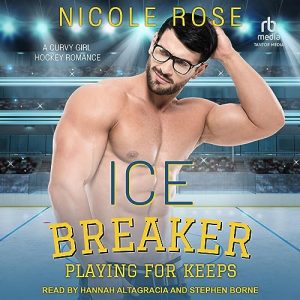I’m over at Dear Author with a review of The Fairytale life of Dorothy Gale by Virginia Kantra. I love Kantra’s writing and I’m so glad I got to read this one.
Category: reviews (Page 11 of 118)
The Wake-Up Call by Beth O’Leary, narrated by Jessie Cave & Lino Facioli. The story was better than the narration.
Reviewed for AudioGals.
Narrated by Jessie Cave & Lino Facioli
I’ve been a fan of Beth O’Leary since The Flatshare (has anyone seen the TV series? It’s pretty good – not as good as the audiobook of course, but still, pretty good!) and have been looking forward to The Wake-Up Call since it popped up in my Audible search some months ago.
Izzy Jenkins and Lucas Da Silva both work at Forest Manor Hotel & Spa in the New Forest. In December 2021, Izzy sends Lucas a Christmas card confessing her infatuation with him. Lucas sends her a generic Christmas card in return. To make matters worse, when Izzy goes to the mistletoe where she hopes to meet Lucas, she see him kissing her flatmate.
Thereafter, Izzy is Team Not-Lucas. She will do anything she can to make his life difficult at work; something that’s pretty easy because she’s a little chaotic and is a firm believer that more is more and everything is better with sparkle and he’s all about order, data and minimalism. (One of Izzy’s many tortures of Lucas is to make him say “Booking Book”.)
It’s clear from the beginning that Lucas is a little lost as to why Izzy went from being nice to him in 2021 to being a witch in 2022. I had a suspicion that maybe his Christmas card from Izzy went astray but Izzy checked with “Poor Mandy” who delivered the Christmas cards and she definitely delivered all of Izzy’s cards, along with everyone else’s to the staff and guests at Forest Manor. (Poor Mandy is so-named because she is the third person on the reception desk and stuck between Izzy and Lucas’s animus. It doesn’t help she has a self-esteem problem and won’t stick up for herself.) Poor Mandy has been the Christmas Elf at Forest Manor for ages and Lucas definitely got a card from Izzy. So… what happened?
The main portion of the story takes place in December 2022 when the ceiling of Forest Manor has caved in and between that, the pandemic and some poor business decisions by the (beloved) owners, the Bartholomews, it’s looking very likely the hotel will shut in the new year. At the very least, some staff will need to be let go. Izzy and Lucas have even more reason for their rivalry now of course.
Over the next couple of weeks Izzy work both with each other and against each other and their latent attraction roars back to life. But Izzy can’t trust Lucas because he humiliated and betrayed her last Christmas. But… maybe a fling would work?
For Lucas’s part, he wants a lot more with Izzy but she doesn’t seem to want him back so he’s reluctant to fling with her because his heart is involved.
I think we all know where this is going.
But that’s pretty common with romance isn’t it? We know it’s going to end at the HEA – it’s all about the journey.
Beth O’Leary has a wonderful humour to her writing which works really well for me. This story is a little more than a big misunderstanding, although a frank conversation early on would have changed everything. As much as I enjoyed the story, I also admit misunderstandings aren’t my favourite.
I found the narration less engaging. Jessie Cave performed all of Izzy’s sections. She was a perfect Izzy and nailed the humour but she did not have any character voices really so there was basically no differentiation between Izzy and everyone else. Still, I enjoyed Ms Cave’s performance better than Lino Facioli’s.
Mr Facioli narrates all of Lucas’s POV and while he does have some character differentiation (a plus) I found his pacing and syntax a little off. I looked Lino Facioli up on the Google and he is in fact a Brazilian-English narrator so he should have been perfect for the role. Lucas is a Brazilian living in England after all. When Mr Facioli was delivering an English accent (as most of the rest of the cast required) he was fine but when he was speaking as Lucas – either by way of narrative or dialogue, he would put odd pauses in between words or phrases, where they didn’t naturally fit. There didn’t seem to be any particular reason for it – unless he ran out of breath maybe? (There was also some audible breathing which… no.)
The Wake-Up Call is full of wonderful quirky characters (other staff and guests of the hotel mainly) and Lucas and Izzy are genuinely delightful and completely belong together. The narration was not quite what the text deserved. However, the story kept me so engaged I was able to overlook most of my concerns and just go along for the ride.
Grade: B
Fighting the Pull by Kristen Ashley, narrated by Lance Greenfield, Stella Bloom & Joseph Discher. Solid entry into the series but equally, I doubt it’s one I’ll revisit.
I’ve dipped in and out of the River Rain series but enjoyed Chloe and Judge’s book (Chasing Serenity) very much and was keen to see how Hale’s HEA was going to work. I also enjoy Stella Bloom and Lance Greenfield’s narrations so picking up Fighting the Pull on audio was an easy choice.
Hale Wheeler has inherited his father’s wealth and has been working almost non-stop to make the various businesses ethical and sustainable. He had a distant relationship with his dad and has a tense one with his mother. He has declared he will never marry. But then he meets Elsa Cohen.
Elsa Cohen has appeared in earlier River Rain books as the creator and face of “Elsa’s Exchange” a kind of Lainey Gossip/TMZ/Entertainment Tonight YouTube channel. Elsa had interviewed Hale’s mother live and unfortunately it did not go well. Hale’s mother (as we say in Australia) “stuck the boot in” to people Hale is close to and the fallout caused a lot of pain and damage. Elsa, for her part, learned never do to live interviews (she pulled the video before Hale’s found family asked her to) and has worked hard to lean away from the more sensational celebrity stories.
Hale ended up making a deal with Elsa: he would grant her an exclusive 1:1 interview if she laid off his family. Now, a year later, Hale wants to fulfill his part of the bargain.
When he and Elsa finally meet, sparks fly and, for reasons, Hale ends up accompanying Elsa to a dinner with her (mostly) toxic family as her fake boyfriend to get them off her back.
Then a misunderstanding keeps them apart for a few months until they have a simple conversation that sets the record straight.
Their relationship is fairly smooth sailing really; they get along well, are very compatible sexually and both are busy, ambitious people who are looking for ways to slow down a little. Elsa is on the cusp of a big streaming deal and is expanding so she doesn’t have to do as much herself. She’s even thinking of opening a West Coast studio. This would suit her relationship goals to as Hale is based in LA (in so far as he’s based anywhere – he travels a lot) and she is in New York.
However, Hale has baggage from his childhood and chooses a particularly bad time to have cold feet.
Meanwhile, there is a stalker and various family drama from Elsa’s side of the equation.
Fortunately (if somewhat unrealistically) it all comes right in the end and they’re all one big happy family by the time the credits roll.
There was one thing which I particularly noted in the story. Mild spoiler: One of the characters in the series is described, late in the book, as having suffered from CTE. In the novel apparently this was diagnosed prior to the character’s death. I was pretty sure that wasn’t possible but I googled to check. Here is the first result that popped up:
Currently, CTE can only be diagnosed after death through brain tissue analysis. Doctors with a specialty in brain diseases slice brain tissue and use special chemicals to make the abnormal tau protein visible. They then systematically search areas of the brain for tau in the unique pattern specific to CTE.
There are very good reasons why it could not have been diagnosed after the character died.
Artistic license I guess.
Moving on.
The narration is very good. Joseph Discher narrates some small sections from the point of view of Hale’s father, Corey Szabo, but most of the book is narrated by Lance Greenfield (Corey’s POV) and Stella Bloom (Elsa’s POV). Mr Discher’s narration was fine but it was also pretty brief so I didn’t have a lot to go on.
Mr Greenfield has a particular cadence to his voice which I suppose won’t work for some people but it works for me. I’ve heard him narrate some of my favourite Kristen Ashley books (Complicated is one example) and something about his performing style suits the way Ms Ashley writes so well.
Similarly, Stella Bloom has narrated numerous Ashley books – I don’t think it’s any kind of secret to say she also narrated the Rock Chick series, albeit under another name. Her voice is one I associate with Ashley books so it puts me right in the zone when I start listening.
Both Greenfield and Bloom are skilled narrators, with good tone and pacing and a keen sense of comedy and irony – something that works well for this author.
While I doubt I’ll end up revisiting Fighting the Pull in the future (unlike many other Kristen Ashley books in my library), I enjoyed the ride while it lasted.
Grade: B-
Not My Kind of Hero by Pippa Grant, narrated by Savannah Peachwood & Connor Crais. Entertaining contemporary about a newly-divorced single mother who moves to a Wyoming hobby farm to find herself and start again and the hot grumpy tenant renting the gatehouse at the end of her driveway.
Not My Kind of Hero features a newly-divorced single mother who moves to the Wyoming hobby farm she inherited from her great uncle, to find herself and start again and the hot grumpy tenant renting the gatehouse at the end of her driveway.
Maisey Spencer used to be the on-screen comedic sidekick to her (now-ex) husband Dean’s home improvement show. But behind the scenes she used to do most of the work. Dean is clearly a jerk. Maisey tried to make her marriage work at the expense of being the parent she wanted to be to her daughter, Juniper (aka Juni). Now divorced, Maisey is determined to do right by Juni and put her first. Dean is disinterested in being a dad and is caught up in his new home improvement show with his new love interest.
Maisey inherited Wit’s End, a hobby farm in Hell’s Bells, Wyoming, from her great-uncle Tony. He had been the black sheep of the family but Maisey had spent some valuable time on the ranch as a teen and kept in touch (albeit sporadically) with Tony over the years. Regardless of the time they spent together, they did love each other. Also, Uncle Tony knew Dean was a jerk and expected Maisey would need a place to stay at some point in her life so he left her the farm. Which was prescient for Tony and lucky for Maisey.
Juni, aged 16 and a junior in high school, is not at all thrilled to be moving away from her friends and her familiar life. However, her old life wasn’t that great either to be fair; Juni’s friends all turned on her when Maisey’s mother was jailed for fraud (oh yeah, there’s that too). Still, Maisey has her work cut out for her to reconnect with Juni.
Flint Jackson is a high school teacher and handyman-type who is the go-to guy in Hell’s Bells when something needs doing. He rents the gatehouse at Wit’s End and has been looking after things and reporting to Maisey by email on necessary repairs, etc., in the year since Tony died. He was extremely close to Tony and judges her harshly for not attending Tony’s funeral and not visiting Tony when he was alive. Maisey apparently brings out the curmudgeon in Flint.
Flint is one of Juni’s teachers and her soccer coach. Because of a bad experience (he did nothing wrong or unethical) at a previous school, Flint has a firm “no dating the parent of a student” policy. As Flint quickly realises there is far more to Maisey than he believed from watching her old home improvement show and from his preconceptions about her, his attraction to her grows. But Juni is his student. Also, Juni hates him.
Maisey is working hard to build a life for herself in Hell’s Bells and find a place to belong. She particularly does not want to do anything which will unsettle Juni even more than she already is and she is determined to put Juni first – something she believes she failed to do for the previous six years or so as she tried to do and be what Dean wanted. As attracted as she is to Flint (once the initial tension over his preconceptions about her is dispelled), she won’t pursue a relationship and risk Juni feeling second best.
There are many quirky small town characters – Opal the local hairdresser and sage, Corey the owner of “Almosta Ranch” next door to Wit’s End and Earl, the local bear.
Tony had a reputation for taking in strays. Flint had been one of them and Maisey kind of is too. Maisey’s dream is to build a place for women who have to start again just like her and so she’s following in Tony’s footsteps.
The narration by Savannah Peachwood and Connor Crais is good, with both narrators differentiating characters well and clearly enjoying the quirky humour of the story.
There were a couple of intimate scenes where Maisey found her bliss very loudly and vocally. I’m not sure whether to feel sorry for Mr Crais for having to perform those sex noises or not but I did find them a bit cringe. I don’t have the book so I can’t read the scene to see whether it was the text or the narration, however. Regardless, they were a bit too much for this listener. Possibly luckily for Ms Peachwood, she didn’t have any of those scenes in her sections of the book.
Otherwise, the narration was smooth from both narrators, with good pacing and intonation.Not My Kind of Hero was an entertaining listen with solid narration from both performers.
Grade: B
I’m over at Dear Author with a review of System Collapse by Martha Wells. Loved it – but I do recommend recapping Network Effect before starting this one.
Ice Breaker by Nichole Rose, narrated by Hannah Altagracia & Stephen Borne. A good start but then things went under pretty fast.
Reviewed for AudioGals. 2.5 stars (the narration was good).
Narrated by Hannah Altagracia & Stephen Borne
The blurb for Ice Breaker looked fun. I enjoy sports romance and I like to try new-to-me authors and narrators from time to time. Novella length audiobooks are a good entry point I think – they give a good taster but with less commitment.
Ice Breaker started well. The narration is solidly good without necessarily being stellar; Stephen Borne has a pleasant raspy huskiness to his voice and his female characters were well done. Hannah Altagracia had a believable enough hero voice without it being super deep and she delivered on Camila’s wide-eyed innocence.
Gray Larsen is a hockey player for the Nashville Predators and needs a new publicist. He punched his previous publicist in the face after he (the publicist) leaked footage of Gray and a woman with whom he was on a date which made the woman look bad. The Predators’ publicist (who for some reason doesn’t represent him and can’t?) suggests Camila Gomes.
Camila doesn’t date athletes. Her sister was cheated on (and worse) by an athlete and subsequently died when her car drove off a bridge. It may have been an accident or the result of her mental distress. Nobody can know. Camila’s beloved adoptive brother was also an athlete and he’s clearly not a jerk so I must say the “no athletes” rule didn’t make a lot of sense to me. As it happened, that rule didn’t last a week after meeting Gray.
Gray and Camila are introduced by the team’s publicist and Gray is immediately smitten. I don’t mind a bit of insta-lust and the notion that a guy could take one look at a woman and say “I’m going to marry that woman” is admittedly romantic to me, so I was prepared to go with it. Camila and Gray clearly have matching sparks flying between them and a lot of chemistry.
But things went off the rails from there.
In no particular order, here is a non-exhaustive list of things I yelled *out loud* at the audiobook as I listened:
“Oh come on now! You don’t even know each other!”
This was after Camila (heretofore a virgin) was in the midst of sex with Gray for the first time and tells him she loves him. They have known each other less than a week and have spent less than 6 hours in each other’s company. This consisted of the meeting in the publicist’s office, some text messages through the week and one date where they played video games and pool for a couple of hours before having sex.
“You’ve only seen her TWO times!”
This was in the response to Gray thinking “she looks more beautiful than I’ve ever seen her”. (My husband pointed out, unhelpfully, that his statement could nonetheless be true.)
“WHAT???!!!”
This was a response to Gray telling Camilla, the very first time they had sex, that he just knew she didn’t want him to use a condom because she wanted to have his babies and that he wanted her to stay in bed with him until she was pregnant. There are So. Many. Things wrong with that statement. Not okay Gray.
Sometimes Gray thinks of Camila as a strong, smart, independent woman deserving of respect and autonomy. Other times he thinks of her as…. not.
“Can romance please be done with this?”
Was in response to Camila’s “will it fit?” (While I’m at it, the hymen is on the OUTSIDE not way up in there.)
“Creepy and gross!”
This was after Gray saw his jizz leaking from Camila and thought he’d like her to wear it all the time so that everyone would know “she’s mine”. *shudders*
Apart from the brief epilogue, the story takes place within an eight day period which is lightning fast. Like insta-lust, I don’t mind a bit of insta-love, but I can’t say I felt like the pair knew each other really so I’m not sure I bought it. Camila moves in after the first date – the same date where she told him she loved him and he told her he wanted to get her pregnant as soon as possible. According to the epilogue which takes place 5 years later, she was pregnant within about 3 months. They are still happily together after five years, so there’s that.
What did save the experience for me was the narration. As I said above, I enjoyed the performances even though I was not super-in-love with the text. I especially liked Stephen Borne’s narration – the difference between his natural husky, deep voice and the female character voices was impressive and there was no hint of caricature. I’d happily listen to him again. I liked Hannah Altagracia’s narration too, but not quite as much. I would not necessarily seek out a book because she was reading it but equally, it would not be any barrier for me to see her name listed.
There is definitely an audience for stories like Ice Breaker. The novella has a rating of 4.16 on Goodreads. But that audience is not me.
Grade: D













